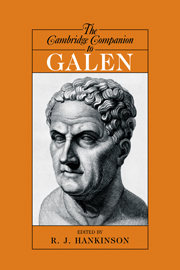Book contents
- Frontmatter
- 1 The man and his work
- 2 Galen and his contemporaries
- 3 Methodology
- 4 Logic
- 5 Language
- 6 Epistemology
- 7 Psychology
- 8 Philosophy of nature
- 9 Anatomy
- 10 Physiology
- 11 Therapeutics
- 12 Drugs and pharmacology
- 13 Commentary
- 14 The fortunes of Galen
- Appendix 1: A guide to the editions and abbreviations of the Galenic corpus
- Appendix 2: English titles and modern translations
- Bibliography
- Index
2 - Galen and his contemporaries
Published online by Cambridge University Press: 28 September 2008
- Frontmatter
- 1 The man and his work
- 2 Galen and his contemporaries
- 3 Methodology
- 4 Logic
- 5 Language
- 6 Epistemology
- 7 Psychology
- 8 Philosophy of nature
- 9 Anatomy
- 10 Physiology
- 11 Therapeutics
- 12 Drugs and pharmacology
- 13 Commentary
- 14 The fortunes of Galen
- Appendix 1: A guide to the editions and abbreviations of the Galenic corpus
- Appendix 2: English titles and modern translations
- Bibliography
- Index
Summary
A considerable portion of Galen's massive literary output is devoted to commenting on and criticizing other theorists, his own contemporaries as well as figures from the past, both doctors and philosophers, individuals and groups, some of whom he praises but most of whom attract his disapproval. One could touch on almost every aspect of Galen's work, in logic, moral philosophy, psychology, physiology, anatomy, pathology, pharmacology and therapeutics by way of an analysis of his reaction to others. So the potential field suggested by the title of this chapter is vast. I shall adopt what may at first sight seem an unusual tactic in order to focus on the topic that will form the core of my discussion, namely Galen's use of his contemporaries and predecessors as foils in constructing his own position by way of contrasting it with theirs. The first section of this chapter will be devoted to Galen and his medical colleagues, before I turn in the second, but shorter section, to his relationship with his philosophical ones.
My starting-point will be the contrast that Galen himself sometimes draws between situations of overt polemic and other contexts, whether of medical practice or of instruction. Of course it is a well-known ploy to disclaim arguing rhetorically when doing precisely that, and there are plenty of occasions where Galen offers such token disclaimers in the heat of sustained polemic. But there are also contexts where his overt aim – as he describes it – is not to win a debate, but to instruct.
- Type
- Chapter
- Information
- The Cambridge Companion to Galen , pp. 34 - 48Publisher: Cambridge University PressPrint publication year: 2008
- 9
- Cited by

